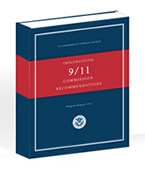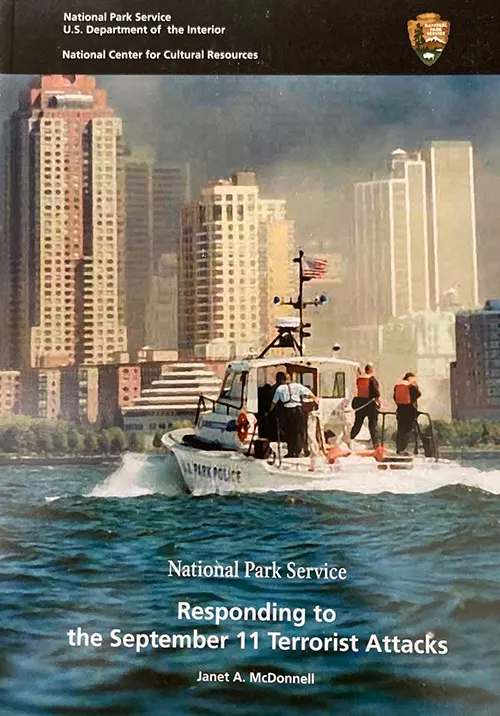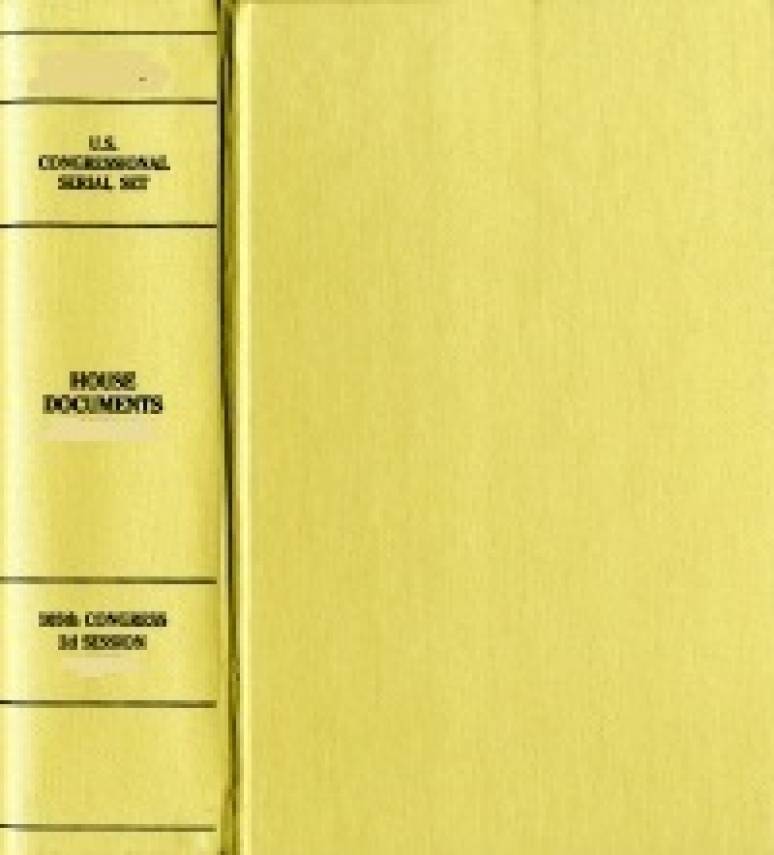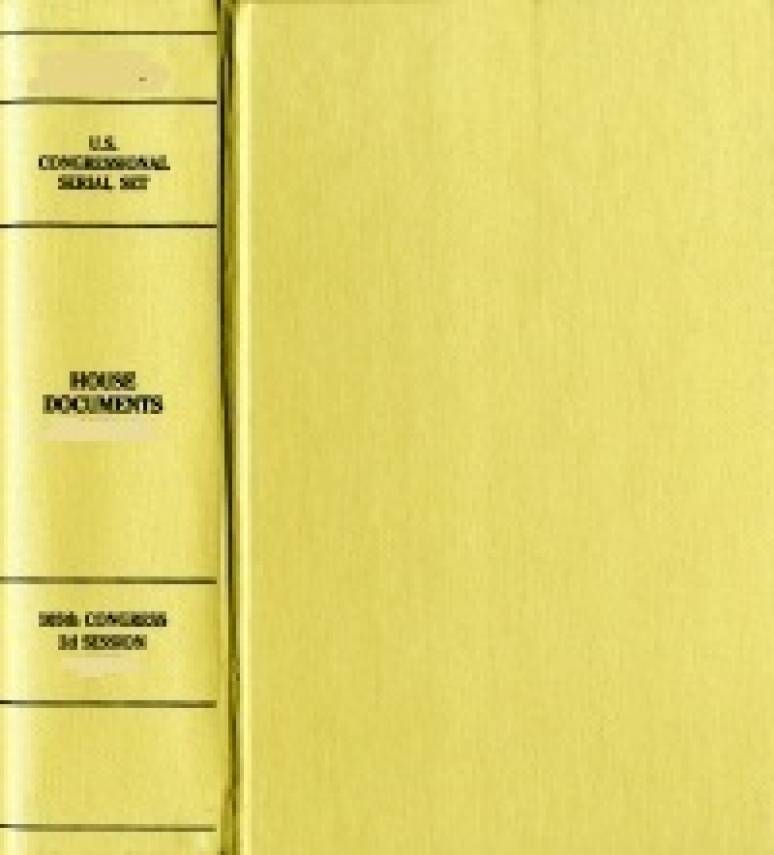9/11 Remembrances: Home
Resources about the Sept. 11, 2001 attacks on the United States with updates for the current year as they become available. This online resource guide is created by Kelley Center for Government Information as part of Fondren Library's FDLP service.
Patriot Day Background
-
Commemorate 9/11Teacher lesson plans and ideas to commemorate 9/11 from the 9/11 Memorial in New York City.
-
Patriot Day (9/11) BackgroundSigned into law (Public Law 107-89) on December 18, 2001 (107th Congress) as a day to remember those who lost their lives in the 9-11 terrorist attacks on our country.
-
September 11 National Day of Service and RemembranceSigned into law on September 11, 2009. Includes classroom resources and answers to FAQs.
Boatlift: An Untold Tale of 9/11 Resilience
Tom Hanks narrates the epic story of the 9/11 boatlift that evacuated half a million people from the stricken piers and seawalls of Lower Manhattan. Produced and directed by Eddie Rosenstein. Eyepop Productions, Inc.
As It Happened: The 9/11 Pentagon Attack
LibGuide Contributors
This resource guide is revised and currently maintained by Mary Kelleher, mk122 at rice.edu, Research Service Librarian I, Kelley Center for Government Information Resources and Civic Engagement.
Other contributor includes:
- Anna Xiong, Head of Kelley Center.
Museum Display/Collections
-
Ground Zero 360: Never Forget
 Traveling exhibit of photos taken by Nicola McClean at Ground Zero on Sept. 11, 2001 previously displayed at the Houston Holocaust Museum.
Traveling exhibit of photos taken by Nicola McClean at Ground Zero on Sept. 11, 2001 previously displayed at the Houston Holocaust Museum. -
Remembering 9/11 Oral History Project,Personal accounts of the 9/11 responders collected by a New York doctor who was treating them.
-
September 11, 2001, Documentary ProjectCaptures the reactions, eyewitness accounts, and diverse opinions of Americans and others in the months that followed the terrorist attacks on the World Trade Center, the Pentagon, and United Airlines Flight 93.
Government Documents
-
9-11 Commission Records
 Includes links to the Commission's mandate, Memorandums for the Record (MFR) (over 1200 fact-finding interviews by the Commission), monographs on the four flights, and an 2004 archived version of the now defunct Commission's Web Site.
Includes links to the Commission's mandate, Memorandums for the Record (MFR) (over 1200 fact-finding interviews by the Commission), monographs on the four flights, and an 2004 archived version of the now defunct Commission's Web Site. -
9/11 Commission ReportFinal Report of the National Commission on Terrorist Attacks Upon the United States. Includes links to the report, and staff monographs and statements. Fondren also has paper copies, call number HV6432.7 .N39 2004.
-
Addressing the Health Impacts of 9/11
 The World Trade Center (WTC) Medical Working Group was appointed by former Mayor Bloomberg from 2007 to 2013 to study and assess the impact of the WTC disaster. The group included representatives from FDNY and NYPD, the city and state health departments, the Health and Hospitals Corporation and Mount Sinai. It published a series of annual reports ending in 2011 summarizing the scientific literature and research recommendations. The WTC Medical Working Group published its last annual report in 2011, after the Zadroga Act became law.
The World Trade Center (WTC) Medical Working Group was appointed by former Mayor Bloomberg from 2007 to 2013 to study and assess the impact of the WTC disaster. The group included representatives from FDNY and NYPD, the city and state health departments, the Health and Hospitals Corporation and Mount Sinai. It published a series of annual reports ending in 2011 summarizing the scientific literature and research recommendations. The WTC Medical Working Group published its last annual report in 2011, after the Zadroga Act became law. -
Implementing 9/11 Commission Report Progress
 Also available online through Fondren Library catalog.
Also available online through Fondren Library catalog. -
National Park Service Responding to the September 11 Terrorist Attacks
 The interviews documented the NPS response to the attacks at the park, regional, and national levels, beginning with the initial response. They also considered the actions taken by NPS staff, and why. Broader impacts of the attacks on NPS operations and allocation of budget resources were also examined. Many interviews described the impacts of the attacks on NPS employees and sought to understand how the attacks may have affected the way staff viewed their jobs and the way Americans viewed national parks. Finally, the project hoped to capture "lessons learned" and to better understand the NPS response and what it says about its values and responsibilities. NPS Historian Janet A. McDonnell used the information gleaned from the oral histories, internal documents, and other sources to prepare the compelling 2004 report
The interviews documented the NPS response to the attacks at the park, regional, and national levels, beginning with the initial response. They also considered the actions taken by NPS staff, and why. Broader impacts of the attacks on NPS operations and allocation of budget resources were also examined. Many interviews described the impacts of the attacks on NPS employees and sought to understand how the attacks may have affected the way staff viewed their jobs and the way Americans viewed national parks. Finally, the project hoped to capture "lessons learned" and to better understand the NPS response and what it says about its values and responsibilities. NPS Historian Janet A. McDonnell used the information gleaned from the oral histories, internal documents, and other sources to prepare the compelling 2004 report -
September 11th Sourcebooks/ National Security ArchiveMakes available the primary source documents widely related to 9/11 in order to "enrich the policy debate, improve journalism, (and) educate policymakers."
-
Tenth Anniversary Report Card: The Status of the 9/11 Commission RecommendationsPDF of the full report or of the report card from the Bipartisan Policy Center.A faster loading pdf is also available from ABC News.
-
United States Congressional Serial Set, Serial No. 14797, House Report No. 792, Joint Inquiry into Intelligence Community Activities Before and After Terrorist Attacks on September 11, 2001 and Errata
 The Senate, Select Committee on Intelligence, and House, Permanent Select Committee on Intelligence examined the intelligence failures leading up to 9/11 and jointly published the results
The Senate, Select Committee on Intelligence, and House, Permanent Select Committee on Intelligence examined the intelligence failures leading up to 9/11 and jointly published the results -
United States Congressional Serial Set, Serial No. 14924, House Report No. 724, 9/11 Recommendations Implementation Act, Pts. 1-6
 Outlines the specific legislative changes enacted by Congress, providing both background and justifications for them along with attribution.
Outlines the specific legislative changes enacted by Congress, providing both background and justifications for them along with attribution.
Armed Forces Remembrances
Government Agencies Remembrances
9/11 Multi-Media
-
9/11 AttacksHistory.com multi-media timeline of the events of 9-11.
-
9/11 Inside the PentagonPBS video premiering Sept. 6, 2016. See information about the video and about the attack on the Pentagon.
-
Encyclopedia of 9/11 (New York Magazine)Online A-Z entries covering 9/11 and its aftermath.
-
The September 11 Digital ArchiveArchives "first-hand accounts, emails and other electronic communications, digital photographs and artworks, and a range of other digital materials related to the attacks" in order to provide an historical context for understanding the events and their consequences.
-
Understanding 9/11: A Television News ArchiveU.S. and international broadcasts of the events of 9/11/2001 and its aftermath. Includes analysis of the media coverage and events.
Web Address: library.rice.edu | Physical Address: 6100 Main Street, Houston, Texas 77005 | Mailing Address: MS-44, P.O. Box 1892, Houston, Texas 77251-1892 | Phone: 713-348-5698 | © 2025 Rice University

